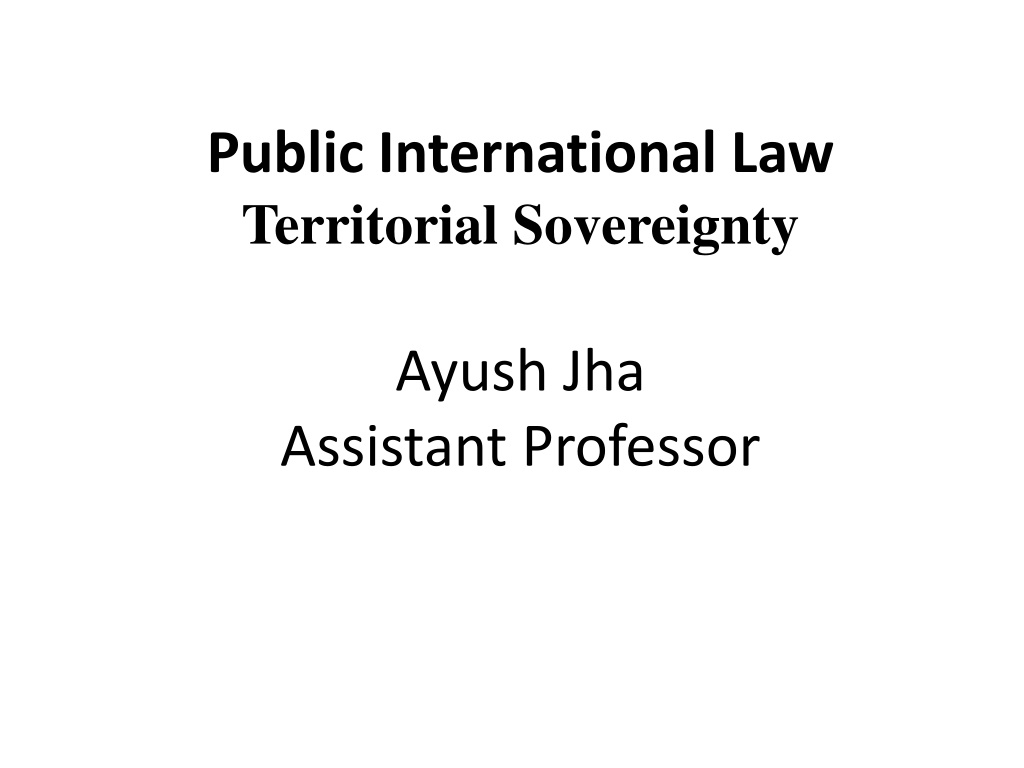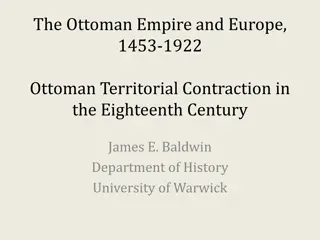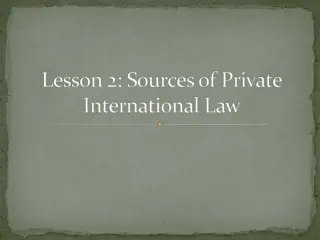Understanding Territorial Sovereignty in Public International Law
Territorial sovereignty is a fundamental concept in Public International Law, essential for understanding the exercise of state authority within a defined territory. This concept encompasses the legal aspects of sovereignty, jurisdiction, and the rules governing territorial ownership changes. The acquisition of territory through original and derivative modes, examples illustrating territorial claims, and the concept of prescription as a method of peacefully acquiring sovereign rights over a territory are explored in detail.
Download Presentation

Please find below an Image/Link to download the presentation.
The content on the website is provided AS IS for your information and personal use only. It may not be sold, licensed, or shared on other websites without obtaining consent from the author. Download presentation by click this link. If you encounter any issues during the download, it is possible that the publisher has removed the file from their server.
E N D
Presentation Transcript
Public International Law Territorial Sovereignty Ayush Jha Assistant Professor
Territorial Sovereignty Meaning of Territory A State without territory is not possible - Oppenhiem. State Territory is a space within which the State exercises its supreme and normally exclusive authority. The legal concepts of sovereignty and jurisdiction can be comprehended only in relation to territory. The centrality of territory in IL can be understood by looking at the rules of its inviolability. The change in ownership of territory has legal effects on the issues of sovereignty and jurisdiction upon the inhabitants.
Territorial sovereignty Max Huber in Island of Palmas Case- Sovereignty in relation between States signifies independence. Independence in regard to a portion of globe is the right to exercise therein, to the exclusion of any other state, the functions of State . It has a positive and a negative aspect. A State exercises its territorial sovereignty within its boundary. The right to territorial sovereignty enables a State to exercise the fullest measures of sovereignty powers over its land territory.
Acquisition of Territory Original and Derivative modes. Occupation Establishment of sovereignty over a territory not under the authority of any other State (terra nullius). The occupation must be by state, must be effective, with intention to claim sovereignty. Eastern Greenland Case- Effective occupation requires 1. Intention or will to act as sovereign. 2. Adequate exercise or display of sovereignty. Mere discovery doesn t create territorial sovereignty unless significant activity is shown. Second requirement can be fulfilled by administering the affairs of the territory via authorities.
Examples: State A claims a fishing island in Indian Ocean as part of its territory because it is close to their shore. But the island is in occupation of state B for over a century even though there is no permanent population. State A discovers a new island and displays its flag there. Subsequently, State B occupies the island. After some years, State A wants to recover island from State B.
Prescription Prescription is a mode of acquisition of a territory which is subject to the sovereignty of another State, (not being terra nullius) through peaceful exercise of de facto sovereignty over a long period of time. Requirements: The acquiring state must not have acquiesced to title of another state. length of time must be adequate. the exercise of de facto sovereignty must be continuous, peaceful and uninterrupted. Possession must be in public. Frontiers Lands Case (Belgium v. Nehterlands), 1959.
Accretion Accretion is a geographical process by which new land is formed mainly through natural causes and becomes attached to existing land. No formal act or assertion on part of the acquiring State is required. Eg: Creation of islands in a rive mouth, the drying up or the change in the course of a boundary river, or the emerging of island after the eruption of an under-sea volcano. In case of a drying or shifting of a boundary river- if the change is gradual and slight, the boundary may be shifted, if the change is violent and excessive, the boundary stays at the same point along the original riverbed.
Annexation Annexation is the extension of sovereignty over a territory by its inclusion into the State. It is resorted to in two circumstances: 1. Conquest or subjugation by annexing State. 2. virtual subordination to annexing state at the time of declaration of intent to annex. Conquest, by itself doesn t grant title to the victorious State. It is no longer a legal mode. However, it does give the victor certain rights under IL relating to the occupied territory.
Cession It is a transfer of sovereignty from one sovereign to another. It rests on the principle that the right of transferring its territory is a fundamental attribute of the sovereignty of a State. It occurs by means of an agreement between the ceding and the acquiring States. Cession of territory may be: 1. Voluntary as a result of a purchase, an exchange, a gift, a voluntary merger, 2. Made under compulsion as a result of a war or any use of force against the ceding State. Re Berubari Union Case (1960)- cession amounts to transfer of sovereignty over a territory to by one State to another sovereign State, and this can be done in exercise of treaty making power.
Leases and Servitudes Sovereignty is passed to the lessee state by the lessor state under a treaty for a certain duration. Ex- Panama Canal (US and Panama), Guantanamo Bay (US and Cuba). Servitudes are exceptional restrictions on the territorial sovereignty of one state to serve interests of another state. Ex- right to use ports or rivers in, or a right of way across, the concerned territory; Constantinople Convention 1888. Wimbledon Case (1923). UOI v. Sukumar Sen Gupta (1990) Right to Passage over Indian Territory Case
Modes of loss of territory Dereliction- abandonment or relinquishment of sovereignty. Corresponds with occupation. Operations of nature- corresponds with accretion. Prescription Cession Subjugation Secession- a state may lose a part of territory either by revolt or peaceful means. Seceding parts become independent states. Grant of independence by imperial states.
Uti possidetis As you possess It is a Roman Law doctrine which was used to maintain status quo during the pendency of a property dispute. In international law this doctrine has been used to ascertain the boundaries of the newly decolonised states. According to the doctrine, the boundaries of the states must be ascertained on the basis of the demarcation of the administrative unit by the antecedent colonial power. In re Frontier Dispute (Burk. Faso/Mali), 1986- the doctrine would take precedence in establishing borders given the paramount importance of stable borders in maintaining the peace , notwithstanding the importance of the principle of self-determination.























